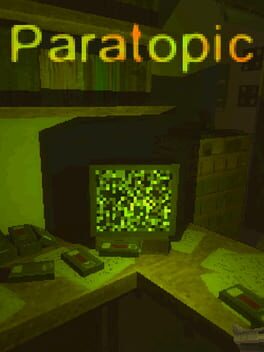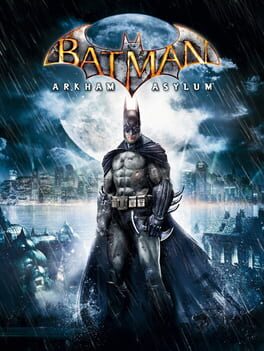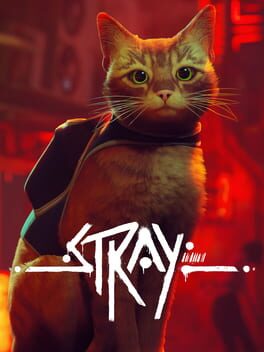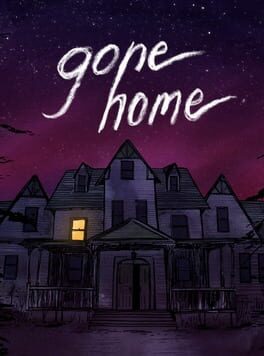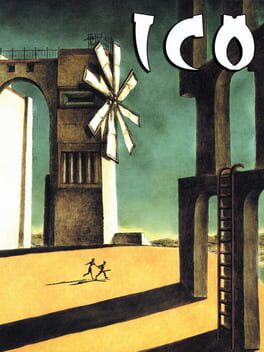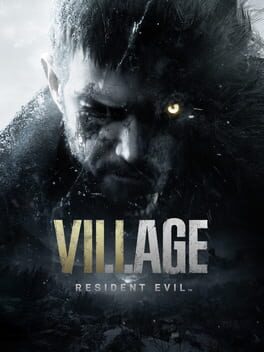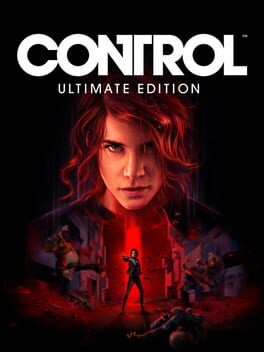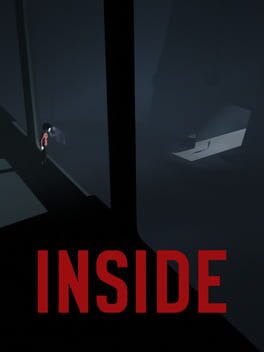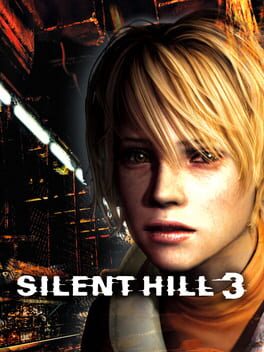pulpfuertes
2018
Fuck knows but I don't think I have seen a game so effectively elicit the nightmarish rhythms of a David Lynch film and the aesthetic murkiness of Tarkovsky's Stalker (with an explicit homage to Solaris to boot) as well as this game does; and all within an excellently succinct hour. First thing I wanted to do upon finishing was to do it all over again and take in its visceral horrors and surrealist images once more. It is a startling game that doesn't beg to be interpreted, only felt and it goes all in with marrying its obvious external influences with a medium that requires direct engagement from the consumer. Perhaps this is what the game is aiming to communicate; the potentially toxic relationship that exists between player and art, and the creator that exploits that link. You can't look away, and the game knows it.
2022
Refreshingly unsentimental where it counts, mostly made up of post-humanist dystopia vibes and not much else. What more do you need in a game than neon lights and a cute kitty though? And this takes full advantage of those on that front. It is confident in its simplicity and knows where to draw the line before becoming needlessly complicated in further building mechanics. The focus remains on the beautifully textured atmosphere and the cat's interactions with the communities and the worlds they inhabit. It's not particularly rich in those explorations and I don't know how this will fare retrospectively but its briskness and accessibility (not to mention gorgeously moody soundtrack) made for a weekend well spent. A rainy day matinee blockbuster wrapped around an indie core. Admirable.
2023
for all intents and purposes, this is the apotheosis to everything the previous remakes have sought to accomplish. it eschews the abstract poeticism of the original- losing the heightened nightmare married pulp power fantasy that it oozed in favor for the grounded visceral realism that defined the previous entries. in that case this succeeds as its not merely trying to replicate the classic but instead continues a thread already established; implementing fine-tuned narrative coherency in its characters and a welcome linearity in its level and environment design. for me, these things are rather perfunctory in the grand scheme but in the moment it is indeed a total blast. there is no doubt this will not age nearly as gracefully as the original if for one reason- a lack of modern innovation. this is simply an incredibly well polished restructuring and reskin of the original, undeniably calculated and carefully considered in every way, and for that it doesn't quite reach masterpiece status for me and probably never will. nonetheless this is an excellent AAA action-horror experience that consistently and cleverly exploits the sheer intensity of most set pieces to peak effect. I had the sweaty palms and the increased heart rate... I just wish the soul was more singular and less reliant on the overwhelming power of its past life.
2013
A near masterpiece of queer rage, the haunted binds of domesticity in flux, and the reflexive nature of memory and narration. Its dated simplicity in visual design is more than made up with its eerily effective sound design and heartbreaking vocal performance by Sarah Grayson. Playing this with the commentary highlighted the intricately complex process that something like this requires within its deceptive exteriors. There's much that goes into the narrative misdirection that the exploration leads the player on and it pays off beautifully by the end. This is a game that initially purports conflict and confusion in its voids of spaces but then become a serenely moving tale that finds ghosts in love and love in ghosts; encased as tragic echoes perpetually trapped in winding suburban hallways and fleetingly filled bedrooms.
2021
this community deserves a better class of 'cult classic'. this game's hare-brained commitment to pastiche, if it can even be called homage, is as tedious as its combat. there's a crude smugness underlining much of this that tries to lighten its self-deprecating nature and vindicate the nonsensical and confused narrative that increasingly put a bad taste in my mouth. to what end does any of this serve? a game whose central concept invites boundless ideas and yet is frequently constrained by rules and thematic barriers. its lovingly rendered environments and eccentric set-pieces ultimately do little to excuse the 2010s-isms that stink up its identity. i can understand its lasting appeal and at points I found its overtly deliberate camp charming but after the hundredth flying refrigerator, thousandth needless fail state, the millionth shootout, and the trillionth Twin Peaks reference, I tapped out.
A game to make Tobe Hooper and Lucio Fulci proud. Lo-fi VHS swamp aesthetics, grotesque body horror and musty set dressing all married with uncomfortably clunky mechanics. It’s such a toxic relationship but all things considered makes for one of the most nerve wracking and accomplished horror experiences I’ve had in a minute. Didn’t give as much credit to this before as I should have even if it still fights with minor third act deflation and rough moments of stuffy first person awkwardness (hopefully will be straightened out in Village). Like pretty much every RE the sense of helplessness gives way to the player’s imminent empowerment through powerful weaponry by the end so I wasn’t as annoyed with the ship/mine sections this time around. In the end, I cannot deny that it’s invigorating to see the franchise finally grapple with what it means for a resident to truly be “evil” in a metaphorical sense, even with the ending somewhat missing out on the punchline with its flagrant optimism. Here, Americana is corrupted and manipulated by capitalist overlords, the rural family unit ruptured and grossly replicated, and any semblance of safety stripped. It’s all such seat-shifting excitement that it’s kinda dazzling that it works at all. While it may miss out on being a masterwork on the likes of some of the other entries, Biohazard is nonetheless a fruitful horror game that reminds us how banally unsettling an empty house really is and how terrifying it feels to know that you’re actually not alone and the dread that comes with seeing just how far down the rabbit hole goes. Good shit.
2012
One of the most astonishingly realized and atmospheric titles; washed in an over saturated and ethereal hue of blinding light and a sparing soundtrack that is no less heavenly and unsettling in equal measure. The game's antiquated and old fashioned structure, its occasional repetition in enemy encounters and frustratingly shoddy platforming, left me a bit cold for slim stretches at a time but there's no denying just how effective and integral and timeless the player's relationship with Yorda is. Despite it all, that finale leaves me speechless and moved. Ico realizes the universal vision of emancipation from powers beyond your understanding and control. The developers craft this twisting labyrinth of a castle to navigate this newfound maturity and responsibility that befalls Ico. There are few games that openly test the patience of its player by simply testing their capacity to be an empathetic human being; guiding someone helpless to shared freedom through an uncommon unity. Exquisite yet maddening in its approach, but are those not the qualities that encompass the trenches of childhood? Ico is modest fantasy as dreamlike nostalgia.
A few weeks removed and this lingers in my head as something genuinely exhilarating. An earnest and true AAA horror blockbuster if I ever played one. As a morbid collection of grotesqueries this succeeds at patiently doling out its dense if simply designed environments for the player to quickly sift through on top of an effectively satisfying central hub. The narrative moves at a lightning pace, never letting up and it's so pleasing to see the varied facets of horror (European gothic, Italian schlock, industrial body horror, the decay of civilized towns and swamps, etc) explored and dissected. This is as much a clever deconstruction of its respective genre as it is a new "Resident Evil" title and that earns it a lot of respect from me for pulling off a neat balance of the two while remaining wholly accessible. Nothing feels short changed and every location and story beat is gorgeously and meticulously designed to deliver maximum atmosphere. While I feel VII might be the more immersive, absorbing entry this is a more than worthy successor if only for how it continuously expands its mythology and Ethan as a character. The inclusion of the typical RE tropes, while expected, were homely and properly integrated in a fashion that only perpetuates this franchise's knack for giving complete wack finales and wraparounds. I was giddy as hell all throughout this. What it means in its totality is yet to be determined but I adored how well Capcom nailed so much of it.
Frequently enthralling in theory, occasionally stumbling in practice, yet incredibly beguiling in retrospect. Like Alan Wake, this is a game that toys with spooky contradictions and the grueling concept of ‘process’. Yet unlike that game (besides this being actually good), this is less a twisting narrative about the complicated and often defeating journey of creating art and deconstructing success than one about the sheer mundane becoming extraordinary and introducing order from such a chaotic dynamic. Elements and objects of everyday existence are touched with the supernatural and the obvious American response to this is to transform these newfound and wondrous discoveries into bureaucratic nonsense; where even the forces of capitalist labor inevitably puncture. Remedy stretches these ideas to its absolute limit, nothing feeling shortchanged through the extensive notes and tapes littered around the map. While I think the game is afraid to allow the player to deduce these simplistic connections (Jesse being a talkative cipher yet largely devoid of personality) it’s pretty wild that a AAA title was allowed to be this devoted to such an overtly antagonistic and distinct aesthetic. The brutalist design here is utterly astonishing in how it invites the player to partake in the haywire destruction of office and industrial spaces; witnessing antiquated practices and oppressive structures devolve into otherworldly abstraction. Perhaps that’s the greatest credit I could owe to Remedy despite the overwritten (yet unsentimental) nature of their creation. Anyways the DLC expansions here are rather bloated and lack the grace and active sense of visual innovation that the base game carried, and the overall experience falls into the familiar trapping of chaining endless enemy encounters as its climax in lieu of something as bold as the first two acts. Ultimately, it’s a game I haven’t stopped thinking about while and since playing. The playful and surreal world Remedy has intricately crafted here shows vast promise and the slick gameplay loop is as addictive and deeply satisfying as it is explosively chic.
2016
Timing is everything. Death here is filtered through as machinery; a natural cog to industrial malevolence. The absence of free will in a dilapidated landscape drives Inside's core mechanics. Like Journey, this game functions best as an immersive and mostly risk-free experience but this one is all the better for that simplicity. Its puzzles are straightforward but the biggest draw for me is just how focused this is on delivering an uncompromisingly stark vision, employing brilliantly ghastly sound work and visceral imagery. I was shocked by how many of these puzzles I instinctively recalled from my last playthrough years ago and that's a credit to just how well the game drives itself into your mind. There's much here that hits you in the gut, and there's no particular logistical reason as to why. It just does. Bodies and spaces, I guess. Yada yada yada.
2019
Distracting yourself from the unease of "normal" life and its creeping potential to break down your barriers of comfort. Easygoing without being overtly cutesy to the point of condescension and defined by subdued visual splendor and a gorgeously dreamy soundtrack, A Short Hike immediately felt like one of my favorite open worlds and front to back remained a care-free joy to play through the two hours it took. Total freedom without feeling overwhelming and efficient design that caters to the depressed and impatient explorer inside us. Reader, I was moved.
2019
next up on this boring wednesday, is a song to get your blood pumping
Barely misses the mark on true five star status- at least for now- if only for how the Leon run slightly drags towards the end (climaxing with the final Mr. X battle which might be the game's only real misstep). By this point it especially hurts after having experienced the superior Claire run and believing the game to be utterly perfect. Beyond that though, this is a genuine AAA horror masterpiece in every way. Skating on narrative (and almost meta) surrealism and packed to the brim with iconic moments of fright and gruesome delight, Resident Evil II's greatest strength is its sheer efficiency in crafting pulpy thrills and placing the naive player in constant states of panicked laughter and sweat-filled anxiety. Simply put, it is just so scary and yet so fun and swings violently between those two modes with immense confidence in itself. In ways this might be the most successful of the franchise on how it balances that dynamic even if it stumbles at times in a way REmake and IV don't. Even still, the extended Sherry and Ada segments, exploring the nonsensical police station and its labyrinths beneath, the bastardized nuclear family illustrated by the Birkins, the abominations lurking in the sewer, the corny expletives shouted by the protagonists when confronting the ass end of biological existence.. and of course the marvel that is Mr. X- a creation so ingeniously straightforward as to suggest inertia but is rather a stroke of mastery by the developers in constantly turning the tables against the player. These and more are all elements that display an insane level of prowess so rarely found in horror games. It is one thing for something to feel bluntly oppressive in its atmosphere (the easy path I'd say) but it's another challenge entirely to structure your overall design in empowering the player yet engulfing them in sterilized environments that instigate vulnerability at every turn. Down that hallway, turn a corner, up a flight of stairs, something's following from behind (or not?), hear a sound from the other side of the room.. perhaps through the walls. It is three dimensional terror that transcends logic and in effect reality itself. The game is its own consuming nightmare and Claire and Leon are themselves manipulated pawns in a manufactured world of ever shifting spaces. I have faith in whatever they're cooking in the next remake.
Barely misses the mark on true five star status- at least for now- if only for how the Leon run slightly drags towards the end (climaxing with the final Mr. X battle which might be the game's only real misstep). By this point it especially hurts after having experienced the superior Claire run and believing the game to be utterly perfect. Beyond that though, this is a genuine AAA horror masterpiece in every way. Skating on narrative (and almost meta) surrealism and packed to the brim with iconic moments of fright and gruesome delight, Resident Evil II's greatest strength is its sheer efficiency in crafting pulpy thrills and placing the naive player in constant states of panicked laughter and sweat-filled anxiety. Simply put, it is just so scary and yet so fun and swings violently between those two modes with immense confidence in itself. In ways this might be the most successful of the franchise on how it balances that dynamic even if it stumbles at times in a way REmake and IV don't. Even still, the extended Sherry and Ada segments, exploring the nonsensical police station and its labyrinths beneath, the bastardized nuclear family illustrated by the Birkins, the abominations lurking in the sewer, the corny expletives shouted by the protagonists when confronting the ass end of biological existence.. and of course the marvel that is Mr. X- a creation so ingeniously straightforward as to suggest inertia but is rather a stroke of mastery by the developers in constantly turning the tables against the player. These and more are all elements that display an insane level of prowess so rarely found in horror games. It is one thing for something to feel bluntly oppressive in its atmosphere (the easy path I'd say) but it's another challenge entirely to structure your overall design in empowering the player yet engulfing them in sterilized environments that instigate vulnerability at every turn. Down that hallway, turn a corner, up a flight of stairs, something's following from behind (or not?), hear a sound from the other side of the room.. perhaps through the walls. It is three dimensional terror that transcends logic and in effect reality itself. The game is its own consuming nightmare and Claire and Leon are themselves manipulated pawns in a manufactured world of ever shifting spaces. I have faith in whatever they're cooking in the next remake.
2003
𝘥𝘰𝘯'𝘵 𝘺𝘰𝘶 𝘵𝘩𝘪𝘯𝘬 𝘣𝘭𝘰𝘯𝘥𝘦𝘴 𝘩𝘢𝘷𝘦 𝘮𝘰𝘳𝘦 𝘧𝘶𝘯?
I’ve taken a considerable amount of time between my experiences with each of the main Silent Hill games. I played the first entry around six-seven years ago when I was still in a mutually toxic relationship and found it excellent yet downright baffling. Containing industrial and metallic horrors beyond immediate comprehension and freaky cults and oddly touching ‘chosen family’ dynamics, it pushed the limits for what I believed a PS1 title could achieve through sheer atmosphere and symbolic prowess alone. After nabbing a decently priced copy of the second game a year post my separation from said relationship (and in the wake of the pandemic), I found myself shattered by its oppressive deconstruction of a guilty conscience and the interconnective nature of trauma- both shared and isolated. How pain binds fractured souls together, and winds them up into botched and abstracted spaces of American normality to fend for themselves on a primal level. It took everything the first entry accomplished and confidently treks into bold territories that challenged the player’s allegiance to their supposed protagonist as well as call attention to their adjacent relationships to side characters- who upon the surface don’t directly contribute much to James’ arc but rather gracefully ebb and flow with the intention of supplementing the themes of the story. These first two games were exhausting to push through, almost sadist in quality and punishing in developer motivation with how they marry deeply complicated and expressionistic narratives with deliberately stunted and claustrophobic gameplay. They are, to me, a primordial testament to what the medium can achieve as singular works of art (as well as propelling the interactive possibilities of horror).
Anyways, Backloggd word salad aside, it has been nearly four years and I have finally gotten to the trilogy capper. I have since healed from my own personal traumas from the relationship that haunted my experiences with the previous two games (but still write the inflated wordy nonsense on here for the four people that actually read my reviews). That word, “healed”, succinctly captures what it felt like to play through Silent Hill III. It is an encompassing coming of age narrative about origin and birthright and interrogates the identity that we are born with versus the one we ultimately choose for ourselves. The game also wraps itself back into the thematic backbone of the first game in a clever way, weaving in ideas of evangelic persecution that removes women’s agency from their bodies and intertwining that with emotional struggles of familial belonging. Team Silent fills the game with the adequate amount of angst, grief, and sass that any teenage girl confronts as they are exposed to the chronic realities of impending adulthood. And yes, it is also very scary; utilizing some fairly cursed sound work and utterly hideous (and frequently phallic) creature designs in addition to incorporating another deliciously brooding soundtrack by Akira Yamaoka. Everything in this game carries the instinct to exercise hostility and discomfort towards Heather. Who didn’t feel that way about the world as an insecure adolescent? At the very least the sense that nothing is quite “okay” permeates much of the game’s wildly structured first half leading up to the story’s venture to the titular town in the second. The player navigates through malls, subway stations, construction sites, office buildings, and apartment complexes with the overall goal of getting home and then from there we are thrust into the familiar spaces we’ve walked before as other characters.
Despite its messy development, this is as much an effectively bittersweet culmination of the franchise’s mythology as it a deliriously unique exploration of its own themes. While I wasn’t as taken with the characterizations here as I was with the previous entry (Douglas didn’t do much for me, sorry), that remains somewhat the only sour note to an otherwise masterful game that I imagine will smooth over with time. Just writing this I look back on my nights playing this fondly and already with slight tinges of nostalgia. Every dream-like moment is so committed to utmost immersion for the player, inducing unease within the most mundane of everyday locations- at least before they are transformed into otherworldly distortions of malice incarnate. This dynamic allows for pulpy levity that toggles self-reflexive tone shifting; registering discordant humor, occasional dramatic poignancy, but mostly unhinged beats of urban surrealism. The game’s iconic visual and thematic aesthetic teamed with Heather’s infectious presence providing a much-needed cushion for the player to fall back on for reprieve against the most ungodly of manifestations, this is truly as well-rounded as horror games can be. Now if someone out there wants to lend me Silent Hill IV..
I’ve taken a considerable amount of time between my experiences with each of the main Silent Hill games. I played the first entry around six-seven years ago when I was still in a mutually toxic relationship and found it excellent yet downright baffling. Containing industrial and metallic horrors beyond immediate comprehension and freaky cults and oddly touching ‘chosen family’ dynamics, it pushed the limits for what I believed a PS1 title could achieve through sheer atmosphere and symbolic prowess alone. After nabbing a decently priced copy of the second game a year post my separation from said relationship (and in the wake of the pandemic), I found myself shattered by its oppressive deconstruction of a guilty conscience and the interconnective nature of trauma- both shared and isolated. How pain binds fractured souls together, and winds them up into botched and abstracted spaces of American normality to fend for themselves on a primal level. It took everything the first entry accomplished and confidently treks into bold territories that challenged the player’s allegiance to their supposed protagonist as well as call attention to their adjacent relationships to side characters- who upon the surface don’t directly contribute much to James’ arc but rather gracefully ebb and flow with the intention of supplementing the themes of the story. These first two games were exhausting to push through, almost sadist in quality and punishing in developer motivation with how they marry deeply complicated and expressionistic narratives with deliberately stunted and claustrophobic gameplay. They are, to me, a primordial testament to what the medium can achieve as singular works of art (as well as propelling the interactive possibilities of horror).
Anyways, Backloggd word salad aside, it has been nearly four years and I have finally gotten to the trilogy capper. I have since healed from my own personal traumas from the relationship that haunted my experiences with the previous two games (but still write the inflated wordy nonsense on here for the four people that actually read my reviews). That word, “healed”, succinctly captures what it felt like to play through Silent Hill III. It is an encompassing coming of age narrative about origin and birthright and interrogates the identity that we are born with versus the one we ultimately choose for ourselves. The game also wraps itself back into the thematic backbone of the first game in a clever way, weaving in ideas of evangelic persecution that removes women’s agency from their bodies and intertwining that with emotional struggles of familial belonging. Team Silent fills the game with the adequate amount of angst, grief, and sass that any teenage girl confronts as they are exposed to the chronic realities of impending adulthood. And yes, it is also very scary; utilizing some fairly cursed sound work and utterly hideous (and frequently phallic) creature designs in addition to incorporating another deliciously brooding soundtrack by Akira Yamaoka. Everything in this game carries the instinct to exercise hostility and discomfort towards Heather. Who didn’t feel that way about the world as an insecure adolescent? At the very least the sense that nothing is quite “okay” permeates much of the game’s wildly structured first half leading up to the story’s venture to the titular town in the second. The player navigates through malls, subway stations, construction sites, office buildings, and apartment complexes with the overall goal of getting home and then from there we are thrust into the familiar spaces we’ve walked before as other characters.
Despite its messy development, this is as much an effectively bittersweet culmination of the franchise’s mythology as it a deliriously unique exploration of its own themes. While I wasn’t as taken with the characterizations here as I was with the previous entry (Douglas didn’t do much for me, sorry), that remains somewhat the only sour note to an otherwise masterful game that I imagine will smooth over with time. Just writing this I look back on my nights playing this fondly and already with slight tinges of nostalgia. Every dream-like moment is so committed to utmost immersion for the player, inducing unease within the most mundane of everyday locations- at least before they are transformed into otherworldly distortions of malice incarnate. This dynamic allows for pulpy levity that toggles self-reflexive tone shifting; registering discordant humor, occasional dramatic poignancy, but mostly unhinged beats of urban surrealism. The game’s iconic visual and thematic aesthetic teamed with Heather’s infectious presence providing a much-needed cushion for the player to fall back on for reprieve against the most ungodly of manifestations, this is truly as well-rounded as horror games can be. Now if someone out there wants to lend me Silent Hill IV..
Vengeance as a preordained impulse. Ellie exists as an emblem of trauma and the player as the casual observer to her building pain and guilt, only extending a hand to act out her violent and reactionary compulsions through button prompts and extensive combat sections. It's horrifying to witness and partake in, but bleakly honest to how rage can drive a person to the limit of their foundational moral standards. The game doesn't force the player through these tribulations as punishment but to underscore the dissonance between how we perceive a character and what they want and how ultimately the player is rendered powerless against the sheer density of said character's desire to fulfill their own needs. Ellie, as her character is expressed by her creators, essentially is an unstoppable force and for better and worse the player is seemingly culpable in the rampage that follows from years of gathered wounds and the traumatic event that sparks the fire. It's difficult to fully accept how this unwavering dynamic shapes this sprawling, brutal, and droning depiction of the cyclical chain of violence and the endless ripples that emanate but the outcome is a streamlined, urgent, and anxious experience that bravely tests patience and comfort levels.
This game is minutely orchestrated to make us feel the weight of our actions however it's not a shallow critique of the player or the characters as many have labeled it but rather acts as a vehicle for perceptive empathy, where through exploration of its dense cityscape and weaving through religious/militant societies, we form our own thematic narratives of what it means to forgive and to understand what drives a person to animalistic madness in a world beyond saving. You get out of this game what you put in. It can be manipulative and cynical, one that tests the line between acceptably nuanced and crudely exploitative. It's in the viciously realized second half where players will either be moved by the innate thesis of what Druckmann and his team have patiently built up or will emotionally tap out and be disgusted by the extent of which they have chosen to take its nihilism. Once the game barrels towards its unyielding finale, I found myself exhausted but utterly immersed. As the executor of Ellie's monstrosity I had become a mere shell of all the atrocity I had committed throughout the game. As the hypnosis of obsession took hold, it rang in my mind the wailing of grief and shrieks of pain I caused and the haunting stillness of Seattle left in disarray.
On a spiritual level I can understand the disdain towards this. In its searing closing set-piece I found it painfully difficult to go through with the final actions and considered stepping away, out of fear that the entire thematic arc I built up in my mind would fall apart. I was at an emotional impasse in which the developer's concluding decisions skirted between satisfying the majority and sacrificing my good will or coming through with the grand ambition from the rest of the game for something special. For me, they made the right choices in the end. This is a massively self indulgent and exposed work of art not unlike how a filmmaker such as Von Trier or Bergman frame their characters as thematic devices; tools to enact the verbosity of human savagery and suffering. On top of that the rampant crunch culture that infects the industry at large reared its ugly head as I marveled at the masterfully designed visual compositions, intense attention to detail of the city itself, and the peerless facial animations that enhance the already terrific cast (Bailey and Johnson give two of the best performances of the year).
This game, to many's disappointments (and my own initially), ruptures the brilliant ambiguity of the first's ending. Why this works is because this is no longer about whether or not a cure is possible or the moral cost of such a cure, but bluntly asks if this is a world deserving of a cure. Despite humanity persisting through resourcefulness and the binds of community it remains eternally tied to the bonds of systemic oppression. The true villain is the idea that we can ever "go back" to the normality that defined past generations' idea of capitalistic order. Chasing the notion of the "American Dream" amidst the rubble of our destruction. Reality is, as showcased by the divide between communities, nothing has changed. Nature has just taken control and has chosen to wipe away the debt. Flawed ideologies are still rampant but are now weaponized by the primal instincts to survive at all costs. Part II acts as a possessed refraction to the previous entry's concept of the perseverance of hope amidst pastoral landscapes. The first game had giraffes and a colorful "road trip" structure to hammer in the expansive nature of Ellie and Joel's journey. In contrast, this is a pitifully inert plateau crowned by the aching consequences that acting from ardent and undying love alone can bring. The rotted, stinking corpse of aforementioned giraffe.
Anyways, most certainly will be game of the year. I both dread and anticipate the inevitable replay on PS5. I doubt anything from 2020 in all mediums of art (film, tv, music, etc) will effect me as deeply and irrevocably as this.
This game is minutely orchestrated to make us feel the weight of our actions however it's not a shallow critique of the player or the characters as many have labeled it but rather acts as a vehicle for perceptive empathy, where through exploration of its dense cityscape and weaving through religious/militant societies, we form our own thematic narratives of what it means to forgive and to understand what drives a person to animalistic madness in a world beyond saving. You get out of this game what you put in. It can be manipulative and cynical, one that tests the line between acceptably nuanced and crudely exploitative. It's in the viciously realized second half where players will either be moved by the innate thesis of what Druckmann and his team have patiently built up or will emotionally tap out and be disgusted by the extent of which they have chosen to take its nihilism. Once the game barrels towards its unyielding finale, I found myself exhausted but utterly immersed. As the executor of Ellie's monstrosity I had become a mere shell of all the atrocity I had committed throughout the game. As the hypnosis of obsession took hold, it rang in my mind the wailing of grief and shrieks of pain I caused and the haunting stillness of Seattle left in disarray.
On a spiritual level I can understand the disdain towards this. In its searing closing set-piece I found it painfully difficult to go through with the final actions and considered stepping away, out of fear that the entire thematic arc I built up in my mind would fall apart. I was at an emotional impasse in which the developer's concluding decisions skirted between satisfying the majority and sacrificing my good will or coming through with the grand ambition from the rest of the game for something special. For me, they made the right choices in the end. This is a massively self indulgent and exposed work of art not unlike how a filmmaker such as Von Trier or Bergman frame their characters as thematic devices; tools to enact the verbosity of human savagery and suffering. On top of that the rampant crunch culture that infects the industry at large reared its ugly head as I marveled at the masterfully designed visual compositions, intense attention to detail of the city itself, and the peerless facial animations that enhance the already terrific cast (Bailey and Johnson give two of the best performances of the year).
This game, to many's disappointments (and my own initially), ruptures the brilliant ambiguity of the first's ending. Why this works is because this is no longer about whether or not a cure is possible or the moral cost of such a cure, but bluntly asks if this is a world deserving of a cure. Despite humanity persisting through resourcefulness and the binds of community it remains eternally tied to the bonds of systemic oppression. The true villain is the idea that we can ever "go back" to the normality that defined past generations' idea of capitalistic order. Chasing the notion of the "American Dream" amidst the rubble of our destruction. Reality is, as showcased by the divide between communities, nothing has changed. Nature has just taken control and has chosen to wipe away the debt. Flawed ideologies are still rampant but are now weaponized by the primal instincts to survive at all costs. Part II acts as a possessed refraction to the previous entry's concept of the perseverance of hope amidst pastoral landscapes. The first game had giraffes and a colorful "road trip" structure to hammer in the expansive nature of Ellie and Joel's journey. In contrast, this is a pitifully inert plateau crowned by the aching consequences that acting from ardent and undying love alone can bring. The rotted, stinking corpse of aforementioned giraffe.
Anyways, most certainly will be game of the year. I both dread and anticipate the inevitable replay on PS5. I doubt anything from 2020 in all mediums of art (film, tv, music, etc) will effect me as deeply and irrevocably as this.
